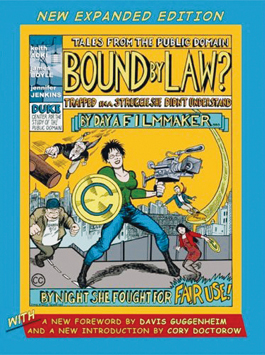home | metro silicon valley index | the arts | books | review

Bound by Law?
Reviewed by Richard von Busack
IT HAS BEEN praised by Davis Guggenheim, director of An Inconvenient Truth, and by Art Spiegelman; the book is introduced by Cory Doctorow, writer and public-use watchdog at BoingBoing.net. Bound by Law? settles matters of fair use for the artist, especially the kitchen-sink documentary maker, and take it from this film critic, there are millions of 'em out there. As Doctorow writes, "The $1,500 laptop I'm typing this on has more RAM, processor and hard-drive than the $100,000 Avid suite I used to baby-sit at a documentary film house."
The authors outline the problem in situationalist style, using a mix of cartoons and appropriated imagery. A documentary filmmaker called Akiko wants to do a one-day-in-the-life-of–New York movie, only to discover that copyright problems abound on all sides. It's there in a baseball game her camera glimpses playing on a TV in a bar; it's there when a girl sings "Happy Birthday to You." Chances are a book, a play or a fictional character will be off the streets longer than a convicted serial killer; a book published in 2002 will be private property for the life of the author plus 70 years—plenty of time for the descendants of today's wretched bestseller author to shoot up, snort or guzzle Grandad's royalties.
"A surrealist garden of Intellectual Property Delights" includes what happened to filmmaker Jon Else when he inadvertently captured 4 1/2 seconds of The Simpsons. The picture of Montgomery Burns used here to characterize Fox's lawyers, however, is satire, and fair use. Terry Gilliam had to pay big money for his glimpse of an Andy Warhol Xerox of a Da Vinci, even though anyone can photograph The Last Supper. And the exciting documentary Tarnation bruited about its budget of only $200, but nearly a half-million was the price to clear the rights to the music on the soundtrack. The bewildering field of intellectual property is cleared nicely in this book, which includes boiled-down accounts of how some very rich companies took people to court to prove they were having their logos stolen. The message: "Fair Use: Use It or Lose It." (By Keith Aoki, James Boyle and Jennifer Jenkins; Duke University Press; 73 pages; $5.95 paperback)
Send a letter to the editor about this story.
|
|
|
|
|
|